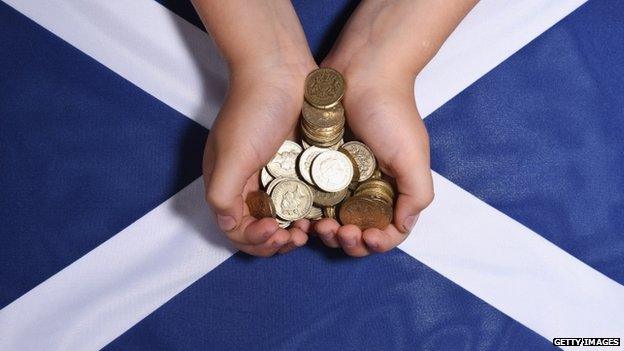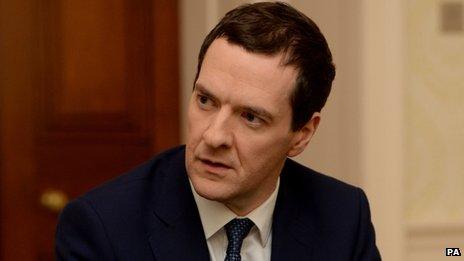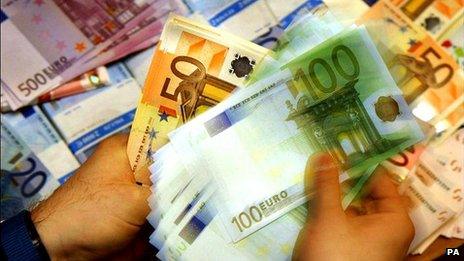That currency question, again
- Published

History, as we know, is written by the victors - though that doesn't mean it ceases to be fought over.
As Scotland's independence referendum moves into the history books, there is a flurry of publication to frame how the story is told.
The instant framing is from the politicians and their social media fans. Books have been hurriedly compiled too.
It is journalists from The Guardian who have gone into most detail - so far - in seeking out revelations as to what really happened behind the scenes on both sides of the debate.
They've got some very interesting insights, though they're still getting quite a sanitised version, as I'm told that being inside both Yes Scotland and Better Together was either brutal or dispiriting.
But they have taken us back to the pivotal moments in the campaign. And the question of currency features prominently.
'No way'
Their version has Lib Dem ministers persuading Chancellor George Osborne to go early in the year with his "no way" to a currency union speech: "Walk away from the union, and Scotland walks away from the pound".
If you remember, he had previously stopped short of that, by saying a currency union between Scotland and the rest of the UK was "unlikely" or even "highly unlikely".
It was pointed out that it would look like a panic measure if he left a firm, flat refusal to do a currency deal until August (other panic measures, it seems, were kept in store for then).
And it was deemed to be a trump card the Better Together campaign could play, as it raised a lot of doubts about earnings, savings, loans, jobs, investments.
We could see at the time, Ed Balls and Danny Alexander, representing Labour and Lib Dems, were choreographed to swing behind the "no deal" message on the same day.
This concerned one of the more audacious claims from the SNP - that it knew what was in the interests of the rest of the UK, how it would play politically in England, and it could expect Westminster to change its currency fundamentally on the strength of a Scottish referendum majority.
The Guardian account suggests George Osborne didn't take much persuading to make his speech in February.

The governor of the Bank of England, Mark Carney, had just been to Edinburgh, to deliver a very carefully worded and balanced speech, which argued that a currency union was possible, but that it would compromise any recognisable notion of independence. The two sides interpreted that to suit their own arguments.
The effect of Osborne's big intervention, in February, was not as planned, however. The tone came across as punitive. It was easily portrayed as "bullying". And it came from a chancellor who, we're told, admits that he doesn't go down well in Scotland.
What was being argued by the Treasury's analysis, but failed to get through clearly in the subsequent heated debate, was that a refusal to do a deal was a calculation of the interests of the rest of the UK, rather than a punishment for leaving - and that ran contrary to the SNP arguments about the rUK needing Scotland's oil to shore up sterling.
Currency argument
There is another significant part of the story, which these Guardian journalists only mention briefly: the contribution of one of them - Westminster correspondent Nicholas Watt.
He reported, in the paper, that an unnamed Whitehall minister had told him: Of course there would be a currency deal, and it would be linked with the future of Trident submarines on the Clyde.
Watt appears to be the only journalist who ever heard any minister say this. But it was enough for Alex Salmond.
I've been told by senior Nationalists that it was one of the worst things that could have happened to them, because it gave the first minister a hook on which a) to argue that the pro-union side was bluffing and b) to ignore any advice from his own side that the Scottish government's currency argument wasn't persuading risk-averse, doubtful and sceptical swing voters..
There was such advice, in public and private. And threatening to repudiate any responsibility for a share of the UK's government debt didn't help much.
For those who continue to fight the referendum argument, the currency question hasn't been resolved. And if there's to be another bid for independence, it will have to be.

Perhaps by that time, the euro will have become less unattractive, reverting to the SNP's previous policy of signing up to it. Lithuania is next in line to do so - it's not toxic everywhere. Or there could be a reassuring case to be made for a separate Scottish currency, but that would take time to build.
It probably doesn't help the economic case for independence that the price of oil has fallen below $60, nor that countries depending on oil production to sustain their government spending and exports are facing a rough ride.
In the case of Russia and the rouble, it's a very rough ride. In the case of Norway - poster-child for small, oil-rich countries - it has no debt to worry it, and a giant trust fund. But it's facing volatility, in that the value of its krone has fallen more than 20% against the US dollar since summer.
That is a devaluation some may welcome in Norway, particularly its non-oil exporters, in salmon and shipping, for instance.
So if there's another push for independence, it will have to tell a different story on oil as well - a case argued by former SNP MSP Andrew Wilson in Scotland on Sunday this week.
He argues nationalists should park their claims for oil, because the challenge is to find a way to tackle the productive capacity of the rest of the economy.
That should be helped by lower energy costs, so long as they last (one of the consequences of a big contraction in investment now could be the prospect of a squeeze on production within the next decade).
But cheaper energy is only the starting point - an opportunity to tackle other, deep-seated challenges.